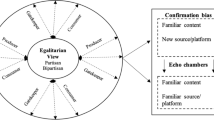Abstract
This study draws on communication accommodation theory, social identity theory and cognitive dissonance theory to drive a ‘Citizen’s Round Table’ process that engages community audiences on energy technologies and strategies that potentially mitigate climate change. The study examines the effectiveness of the process in determining the strategies that engage people in discussion. The process is designed to canvas participants’ perspectives and potential reactions to the array of renewable and non-renewable energy sources, in particular, underground storage of CO2. Ninety-five people (12 groups) participated in the process. Questionnaires were administered three times to identify changes in attitudes over time, and analysis of video, audio-transcripts and observer notes enabled an evaluation of level of engagement and communication among participants. The key findings of this study indicate that the public can be meaningfully engaged in discussion on the politically sensitive issue of CO2 capture and storage (CCS) and other low emission technologies. The round table process was critical to participants’ engagement and led to attitude change towards some methods of energy production. This study identifies a process that can be used successfully to explore community attitudes on politically-sensitive topics and encourages an examination of attitudes and potential attitude change.

Similar content being viewed by others
References
Ashworth P, Boughen N, Mayhew M, Millar F (2010) From research to action: now we have to move on CCS communication. Int J Greenh Gas Control 4:426–433
Ashworth P, Bradbury J, Feenstra CFJ, Greenberg S, Hund G, Mikunda T, Wade S (2012) What’s in store: lessons learnt from CCS. Int J Greenh Gas Con 9:402–408
Bittle RG, Valesano R, Thaler G (1980) The effects of daily cost feedback on residential electricity usage as a function of usage level and type of feedback information. J Environ Syst 9:275–287
Bryman A (2008) Social research methods, 3rd edn. Oxford University Press, Oxford
Buys L, Miller E, Megen K (2012) Conceptualising climate change in rural Australia: community perceptions, attitudes and (in)actions. Reg Environ Chang 12(1):237–248
Cunningham-Burley S (2006) Public knowledge and public trust. Comm Genet 9(3):204–210
Desbarats J, Upham P, Riesch H, Reiner D, Brunsting S, De best Waldhober M, Duetschke E, Oltra C, Sala R, McLachlan C (2010) Review of the public participation practices for CCS and non-CCS projects in Europe. IEEP
DRET (Department of Resources, Energy and Tourism) (2008) Key facts on Australia’s energy industry. www.ret.gov.au/energy/facts/Pages/EnergyFacts.aspx
Echabe E, Castro L (1999) Group discussion and changes in attitudes and representations. J Soc Psychol 139(1):29
Edenhofer O, Pichs-Madruga R, Sokona Y, Seyboth K, Matschoss S, Kadner S, Zwickel T, Eickemeier P, Hansen G, Schloemer S, von Stechow C (eds) (2011) IPCC report: renewable energy sources and climate change mitigation. Cambridge University Press, Cambridge
Festinger L (1957) A theory of cognitive dissonance. Row, Peterson, Oxford
Financial Review Newspaper (2003) Web address: http://afr.com/australia/2003/03/11/FFXLOKR93DD.html. Accessed 01/11/03
Fischhoff B, Fischhoff I (2001) Public’s opinion about biotechnologies. Agbioforum 4(3/4):155–162
G8 IEA CSLF (2007) Near term opportunities for carbon capture and storage 3rd Workshop. Results from the Calgary workshop November 27 & 28. IEA CSLF
Gallois C, Giles H (1998) Accommodating mutual influence in intergroup encounters. In: Palmer MT, Barnett GA (eds) Mutual influence in interpersonal communication: theory and research in cognition, affect and behavior. Progress in Communication Sciences, vol 14. Ablex, New York, pp 130–162, series editor Barnett GA
Gardner MJ, Paulsen N, Gallois C, Callan V, Monaghan PG (2001) Communication in organisations: An intergroup perspective. In: Robinson WP, Giles H (eds) The new handbook of language and social psychology. Wiley, London, pp 561–584
Garnaut R (2007) Issues paper 4: research and development: low emissions energy technologies. Garnaut Climate Change Public Forum http://www.garnautreview.org.au
Giles H (1971) Patterns of Evaluation to R.P., South Welsh and Somerset accented speech. Br J Soc Clin Psychol 10(3):280–281
Holloway S (2001) Storage of fossil fuel-derived carbon dioxide beneath the surface of the earth. Annu Rev Energy Environ 26:145–166
Hogg MA, Terry D (2001) Social identity processes in organisational contexts. Psychology Press, Philadelphia
Horowitz M (2004) Electricity intensity in the commercial sector: market and public program effects. Energy J 25(2):115–138
IEA (2006) Key world energy statistics. IEA/OECD, Paris
Kantola S, Syme G, Campbell N (1984) Cognitive dissonance andenergy conservation. J Appl Psychol 69(3):416–422
Manis M (1978) Cognitive social psychology and attitude change. Am Behav Sci 21(5):675–690
O’Keefe L, Herzog P, Reiner R (2009) Survey of public attitudes on energy and the environment. MIT CSI
OECD (2001) Citizens as partners: information, consultation and public participation in decision making. Organisation for Economic Co-operation and Development. http://www.oecd.org/document
Patton MQ (1990) Qualitative evaluation and research methods, 2nd edn. Sage, Newbury Park
Petty RE, Cacioppo JT (1986) Communication and persuasion. Central and peripheral routes to attitude change. Springer, New York
Radio National Earthbeat (2000) September 30th. Web address: http://www.abc.net.au/rn/science/earth/stories/s197984.htm. Accessed 01/11/03
Rubin ES, Chen C, Rao AB (2007) Cost and performance of fossil fuel power plants with CO2 capture and storage. Energy Policy 35:4444–4454
Siero F, Bakker A, Dekker G, van den Berg M (1996) Changing organizational energy consumption behaviour through comparative feedback. J Environ Psychol 16:235–236
Tajfel H, Turner JC (1986) The social identity theory of intergroup behaviour. Psychology of intergroup relations. Nelson-Hall, Chicago, pp 7–24
Terry DT, Hogg MA, Duck J (1999) Group membership, social identity and attitudes. In: Abrahams D, Hogg MA (eds) Social identity and social cognition. Blackwell, Oxford, pp 280–314
Walls M (2008) Disposing of Britain’s nuclear waste. Energy Environ 19(3):515–557
Watson R (ed) (2001) Climate change 2001: synthesis report. Intergovernmental panel on climate change. Cambridge University Press, Cambridge
Weeks EC (2000) The practice of deliberative democracy: results from four large-scale trials. Public Adm Rev 60(4):360–372
Wegner DM (1986) Transactive memory: a contemporary analysis of the group mind. In: Mullens B, Goethals GR (eds) Theories of group behaviour. Springer, New York, pp 185–208
Acknowledgments
The research was funded by the Commonwealth Scientific and Industrial Research Organisation (CSIRO).
Author information
Authors and Affiliations
Corresponding author
Rights and permissions
About this article
Cite this article
Pisarski, A., Ashworth, P. The Citizen’s Round Table process: canvassing public opinion on energy technologies to mitigate climate change. Climatic Change 119, 533–546 (2013). https://doi.org/10.1007/s10584-013-0709-4
Received:
Accepted:
Published:
Issue Date:
DOI: https://doi.org/10.1007/s10584-013-0709-4




